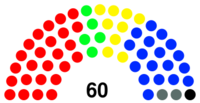Vrnallian Chamber
| This page is a work in progress by its author(s) and should not be considered final. |
| Vrnallian Chamber Vrnaljaj Dnàje | |
|---|---|
| Leadership | |
| Speaker of the Chamber | Fórokos Jeru, Progressive Party |
| Premier by Appointment | Cismachà Zujka, Socialist Party |
| Leader of the Opposition | Gramúsichto Tivina, Conservative Party |
| Structure | |
| Seats | 60 Representatives |
 | |
| Political groups |
Government (39)
Opposition (21)
|
| Elections | |
| Voting system | Alternative Vote |
The Chamber (Dnàje pronounced /ˈdⁿaːjɛ/) is the larger segment of the Vrnallian Parliament, along with the Council. The Chamber is sometimes thought of as being the legislative chamber, though this is not entirely accurate.
The sixty-member Chamber is elected by the people using the alternative vote system in each of Vrnallia's sixty constituencies. The party or coalition with a majority of seats in the Chamber forms the government, while the remaining parties form the opposition. The Vrnallian Premier, properly styled Premier by Appointment of the Vrnallian Chamber, is typically appointed by the First Minister, hence the name, though the current Socialist Party Premier, Cismachà Zujka, was elected by her party as a whole despite retaining the traditional name. The leader of the opposition is traditionally the most senior member of the largest opposition party or coalition.
The current government in the Chamber is made up of a Socialist-Progressive-Centrist coalition, while the opposition consists of the Conservative and Nationalist parties and an independent Representative.
Contents
[hide]History
The Vrnallian Chamber has its origins in the moots held in the time of the Vrnallian Empire. The Vrnallian word dnàje originally means "gathering" or "assembly" from the Old Vrnallian word dráhája meaning "meet" or "come together." In the Empire, landholders would gather in Dvrieska's Jàriach Hall (Old Vrnallian: Ahárjáska) and debate issues affecting the Empire. After Vrnallia became a Phaedrian vassal, the system remained in a slightly altered form, with sixty landholding families - the nobility - selecting one of their own to represent them in the Jàriach Dnàje.
As Vrnallia evolved as a state the representatives were chosen from the nobility by all property-owning males in each constituency. Eventually with the writing of the First Constitution the nobility was deposed and these representatives were directly elected by property-owning males. The Second Constitution extending the vote to married women, and in 1920 universal franchise was introduced.
Before the Electoral Simplification Act
Until 1950 with the passage of the Electoral Simplification Act, the election process for the Chamber was complex. Each island group used its own choice of voting system, with a further distinction between the system used on Mlekie and the system used on Vorod, Irihtà and Halkazia. Furthermore the restrictions on candidates running for election were inconsistent and archaic, such as men born on Vorod being able to stand for election to any island except Mlekie, except for two constituencies where they could stand in Mlekie and all the constituencies of Hujre where they could not stand (it must be noted that many of these rules had been ignored since universal enfranchisement). With the extension of voting these problems became more apparent hence the decision to simplify.
The Act established a simple set of rules for elections in Vrnallia: that all islands used one system of voting at each level of federal elections, that the only requirements for standing in an election were that a person be a legal adult and, for federal elections, a native Vrnallian or second-generation migrant, and that states may choose voting systems for devolved elections freely with a majority parliamentary vote.
